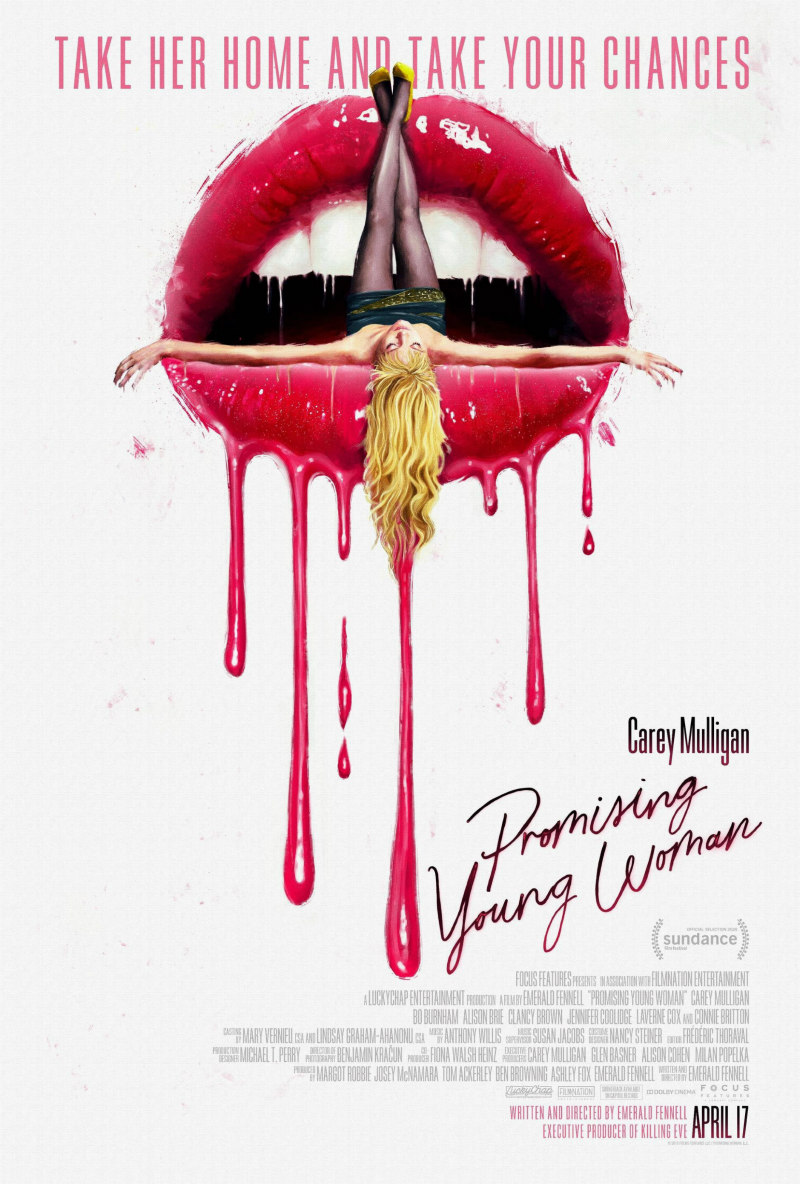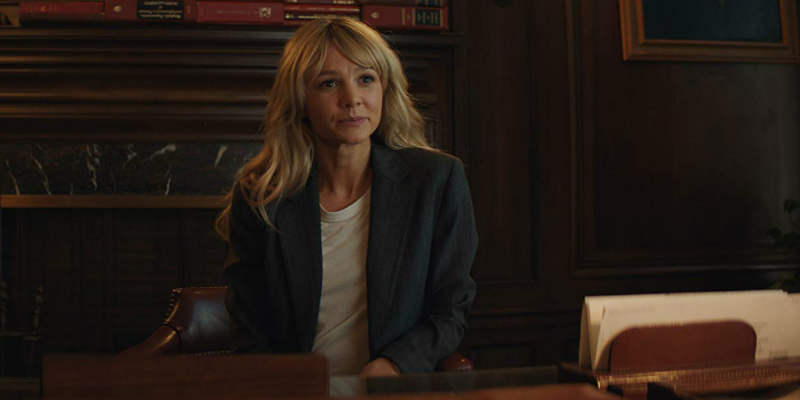
Review by Eric Hillis
Directed by: Emerald Fennell
Starring: Carey Mulligan, Bo Burnham, Laverne Cox, Clancy Brown, Jennifer Coolidge, Alison Brie, Christopher Mintz-Plasse, Molly Shannon

In recent years a new wave of women filmmakers have revitalised the long dormant rape revenge genre, applying wit, nuance, complexity and some damn good filmmaking to a genre that had largely been the privy of cynical hacks. Their approaches to the format have ranged from downright gritty (Madeleine Sims-Fewer and Dusty Mancinelli's Violation; Isabella Eklöf's Holiday) to cartoonish (Coralie Fargeat's Revenge), with some falling in between (The Soska Sisters' American Mary; Christine Molloy and Joe Lawlor's Rose Plays Julie).
Actress turned writer/director Emerald Fennell's debut Promising Young Woman opts for the cartoonish end of the scale in its day-glo colour scheme, but its script largely plays it deadly serious. It's a creative conflict that results in a movie that takes tonal shifts so abruptly you may want to cling onto the armrests of your chair to remain upright.

Like its protagonist, Fennell's movie begins with much promise. The always great Carey Mulligan is Cassie, once a top student who walked out of medical school following the sexual assault of her best friend by a frat boy, an incident both the faculty and Cassie's classmates failed to deal with seriously. Now approaching her 30th birthday, Cassie finds herself living with her parents and working in a coffee shop. When night falls she becomes an avenging angel, visiting nightclubs where she acts blind drunk, knowing she will inevitably attract the attention of predatory men. When said men get Cassie back to their pads, they quickly learn that she is stone cold sober, and any plans they have of taking advantage of a prone young woman evaporate.
Just how Cassie deals with these men is left unclear. She writes the names of her "victims" in a notebook, some in black ink, some in red, but the significance of the colour designation is ambiguous. Could it denote whether any physical punishment was involved, or perhaps whether or not she herself was a subject to violence? We see her leave one man's home with a trickle of what could be either blood or strawberry ripple down her arm, so we suspect she has meted out some form of violence. Yet the next unsuspecting bro to take her home simply receives a lecture on how to treat women.
[ READ MORE: New Release Review - Songs My Brothers Taught Me ]
The connotations of said lecture really irked me, as Cassie suggests that having sex with a stranger with whom you don't share any emotional connection is tantamount to an assault, as though sex is an act of aggression when carried out independent of feelings. What century was this movie written in? Is it secretly one of those Christian movies that are so popular now in the US?

If I was initially sympathetic to Cassie's actions, this puritanical philosophy threatened to derail any engagement I had with her quest. But perhaps Fennell doesn't want us to entirely support her (anti?) heroine's actions. After all, most vigilante movies reach a point where their protagonist's sense of right and wrong crosses a line. There's a point in Promising Young Woman where it seems as though Cassie has gone full sociopath, putting women in harm's way to prove her point. Aah, now we're getting somewhere. Maybe this movie is far more interesting and complex than it's led us to believe after all. But no, the movie pulls back and leaves us in no doubt that Cassie is its unambiguous heroine.
Things take a turn when Cassie falls for Ryan (Bo Burnham), a former classmate who was a friend of the rapist who ruined the lives of Cassie and her best friend. Yet we're given no plausible explanation as to why she would be won over by Ryan, given how attuned she is to the masks worn by so-called "nice guys". Ryan hands out more red flags than the organisers of a Labour Party convention, particularly when he bumps into Cassie on one of her undercover "drunken dates" with another man and behaves as though he has some sort of a claim on her (they haven't even so much as locked lips at this point).
[ READ MORE: New Release Review - A Common Crime ]
If you read the script of Promising Young Woman I imagine you might picture it as a dark thriller, which makes its concessions to middle of the road comedy so difficult to understand. The supporting cast is almost entirely made up of performers with comedy backgrounds (along with Burnham we get Alison Brie, Molly Shannon, Laverne Cox, Jennifer Coolidge, Max Greenfield, Christopehr Mintz-Plasse et al), the film has the bland look of something Katherine Heigl might have starred in a decade ago, and pop songs with on-the-nose lyrics accompany most scenes. Yet, as you might expect given its subject, Promising Young Woman rarely generates laughs. It doesn't give us much pathos either, relying heavily on Anthony Willis's score to clue us into how seriously we should be taking any given scene.

Mulligan is, as you might expect, excellent here, but the rest of the film never rises to her level. It's frankly a mess, largely due to its inconsistent tone. Many of its issues stem from its failure to credit the audience with an ability to foreshadow its plot. We know where things are headed with Cassie and Ryan as soon as they meet, yet the film drags out their rom-com dalliance in a fruitless attempt to pull the wool over our eyes. Its ending is designed as a punch the air moment, but it's implausible, too reliant on a set of circumstances coming together.
As an actress, Mulligan continues to fulfil her promise of becoming one of the most talented performers of her generation, but on the evidence of this ramshackle debut, I'll need more convincing regarding her director's potential for greatness.

Promising Young Woman is on Sky Cinema from April 16th.
